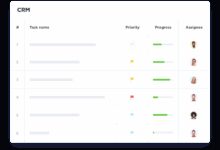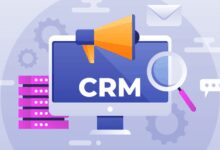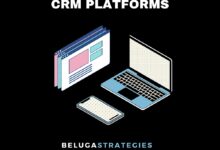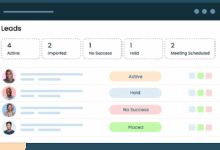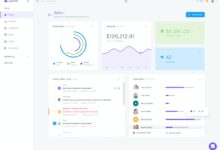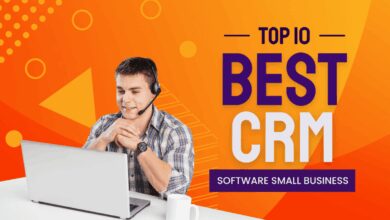CRM Software for Small Businesses: 7 Powerful Tools to Skyrocket Growth
Running a small business means wearing many hats — from sales to customer service. But what if you could streamline it all? Enter CRM software for small businesses: your secret weapon for smarter growth, better relationships, and higher efficiency.
Why CRM Software for Small Businesses Is a Game-Changer

Customer Relationship Management (CRM) software isn’t just for big corporations. In fact, small businesses often benefit the most from implementing a CRM system early. It helps organize customer data, track interactions, and automate repetitive tasks — all critical for scaling efficiently.
Centralized Customer Data for Smarter Decisions
One of the biggest challenges small businesses face is scattered customer information — emails in inboxes, notes in spreadsheets, calls logged in voicemails. CRM software for small businesses consolidates all this data into one secure, accessible platform.
- Store contact details, purchase history, and communication logs in one place
- Access real-time customer insights from any device
- Reduce errors caused by manual data entry
“A CRM turns random interactions into meaningful relationships.” — HubSpot
Improved Customer Retention and Satisfaction
Retaining a customer is up to 5x cheaper than acquiring a new one. With CRM software for small businesses, you can track customer behavior, anticipate needs, and deliver personalized experiences that keep clients coming back.
- Send automated follow-ups after purchases
- Tag customers based on preferences or behavior
- Resolve issues faster with full interaction history
Top 7 CRM Software for Small Businesses in 2025
Choosing the right CRM can feel overwhelming. To help, we’ve analyzed the top 7 CRM platforms tailored for small businesses — balancing affordability, ease of use, and powerful features.
1. HubSpot CRM
HubSpot CRM is a favorite among small businesses for its intuitive interface and robust free plan. It’s perfect for startups and growing teams that want powerful automation without complexity.
- Free forever plan with contact management, email tracking, and deal pipelines
- Seamless integration with Gmail, Outlook, and HubSpot’s marketing tools
- AI-powered email suggestions and meeting scheduling
HubSpot also offers excellent educational resources. According to HubSpot’s official site, over 170,000 companies use their CRM to grow better.
2. Zoho CRM
Zoho CRM stands out for its customization and AI capabilities. It’s ideal for small businesses that need flexibility without sacrificing affordability.
- Zia AI assistant predicts deal closures and suggests next steps
- Customizable workflows, sales automation, and territory management
- Tight integration with other Zoho apps like Books, Campaigns, and Desk
Zoho CRM starts at just $14/user/month and offers a 15-day free trial. Learn more at Zoho CRM’s official page.
3. Salesforce Essentials
Salesforce isn’t just for enterprises. Salesforce Essentials is a simplified version designed specifically for small businesses with up to 10 users.
- Mobile-first design with offline access
- Pre-built sales processes and automation
- Real-time analytics and forecasting
While it’s pricier than others (starting at $25/user/month), it offers enterprise-grade reliability. Visit Salesforce Essentials to explore its capabilities.
4. Freshsales (by Freshworks)
Freshsales combines a clean UI with powerful AI and phone integration. It’s great for sales-driven small businesses that want built-in calling and lead scoring.
- AI-based lead scoring to prioritize hot prospects
- Click-to-call, voicemail, and call recording
- Visual deal pipeline and email sequences
Freshsales offers a free plan for up to 3 users and paid plans starting at $15/user/month. Check it out at Freshworks CRM.
5. Pipedrive
Pipedrive is built for sales teams that want a visual, pipeline-focused CRM. It’s especially popular among small sales teams who need clarity and simplicity.
- Drag-and-drop sales pipeline for easy tracking
- Activity reminders and goal tracking
- Strong integration with Gmail, Slack, and Zapier
Pipedrive starts at $14.90/user/month and offers a 14-day free trial. Learn more at Pipedrive’s website.
6. Insightly
Insightly bridges the gap between CRM and project management. If your small business juggles client projects and relationships, this could be your ideal fit.
- Project and task management within the CRM
- Customer lifecycle tracking from lead to renewal
- Workflow automation and email integration
Pricing starts at $29/user/month, with a free plan for up to two users. Visit Insightly for details.
7. Keap (formerly Infusionsoft)
Keap is designed for service-based small businesses like consultants, coaches, and agencies. It excels in marketing automation and appointment scheduling.
- Automated email campaigns and SMS follow-ups
- Calendar syncing and appointment booking
- Invoicing and payment collection tools
Keap starts at $99/month for the Lite plan. Explore it at Keap’s official site.
crm software for small businesses – Crm software for small businesses menjadi aspek penting yang dibahas di sini.
Key Features to Look for in CRM Software for Small Businesses
Not all CRMs are created equal. When evaluating options, focus on features that align with your business goals and team size.
Contact and Lead Management
The foundation of any CRM is managing contacts and leads. Look for tools that allow you to import, segment, and track every interaction.
- Automated contact capture from emails and forms
- Tagging and filtering by source, status, or behavior
- Duplicate detection and data enrichment
Sales Pipeline and Deal Tracking
A visual sales pipeline helps you understand where each deal stands and forecast revenue more accurately.
- Customizable stages (e.g., Prospecting, Demo, Negotiation)
- Drag-and-drop interface for easy updates
- Deal value, close date, and probability tracking
Automation and Workflow Tools
Automation saves time and reduces human error. The best CRM software for small businesses offers no-code automation for common tasks.
- Automated email sequences and follow-ups
- Task assignments based on triggers (e.g., after a call)
- Lead assignment rules for team distribution
How to Choose the Right CRM Software for Small Businesses
Selecting a CRM isn’t just about features — it’s about fit. Here’s a step-by-step guide to making the right choice.
Assess Your Business Needs
Start by identifying your pain points. Are you losing leads? Missing follow-ups? Struggling with team collaboration?
- List your top 3 challenges
- Determine if you need marketing, sales, or service features
- Consider future growth and scalability
Set a Realistic Budget
CRM pricing varies widely. While free tools are great for starters, paid plans offer more depth.
- Free: HubSpot, Freshsales (limited users)
- Mid-tier: Zoho, Pipedrive ($15–$30/user/month)
- Premium: Keap, Salesforce ($50+/month)
Remember to factor in costs for training, add-ons, and integrations.
Test Before You Commit
Most CRM software for small businesses offers free trials or freemium plans. Use them to test usability and team adoption.
- Invite team members to test the interface
- Import real data to see how it performs
- Check mobile app functionality
Common CRM Implementation Mistakes to Avoid
Even the best CRM can fail if implemented poorly. Here are common pitfalls and how to avoid them.
Skipping Team Training
Adoption starts with understanding. If your team doesn’t know how to use the CRM, they won’t use it.
- Provide onboarding sessions
- Create internal documentation
- Appoint a CRM champion
Over-Customizing Too Early
While customization is powerful, overdoing it early can lead to confusion and technical debt.
- Start with default settings
- Customize only after identifying real needs
- Document all changes for future reference
Ignoring Data Quality
Garbage in, garbage out. Poor data quality undermines the entire CRM system.
- Standardize data entry formats
- Regularly clean duplicates and outdated records
- Use validation rules to prevent errors
Integrating CRM Software with Other Business Tools
A CRM shouldn’t work in isolation. The best results come when it integrates with your existing tech stack.
Email and Calendar Sync
Syncing with Gmail or Outlook ensures all communications are logged automatically.
- Email tracking shows when messages are opened
- Calendar sync prevents double-booking
- Meeting notes auto-attached to contact records
Marketing Automation Platforms
Linking your CRM with tools like Mailchimp or ActiveCampaign enables targeted campaigns.
- Sync lead tags for personalized email sequences
- Track campaign ROI directly in the CRM
- Trigger follow-ups based on email engagement
Accounting and Payment Systems
Integrating with QuickBooks, Stripe, or PayPal streamlines invoicing and payment tracking.
- Create invoices directly from CRM deals
- Update deal status when payments are received
- View customer lifetime value in one place
Measuring the ROI of CRM Software for Small Businesses
How do you know if your CRM is worth it? Track these key metrics to measure return on investment.
Sales Conversion Rates
Compare your conversion rates before and after CRM implementation.
crm software for small businesses – Crm software for small businesses menjadi aspek penting yang dibahas di sini.
- Track lead-to-customer conversion percentage
- Measure average deal size changes
- Monitor sales cycle length
Customer Retention and Lifetime Value
A good CRM helps you nurture long-term relationships.
- Calculate customer retention rate annually
- Track repeat purchase frequency
- Estimate customer lifetime value (CLV)
Team Productivity and Time Savings
Automated tasks free up time for high-value work.
- Measure time spent on manual data entry
- Track number of follow-ups sent automatically
- Survey team satisfaction with workflow efficiency
Future Trends in CRM Software for Small Businesses
CRM technology is evolving fast. Stay ahead by understanding upcoming trends.
AI-Powered Insights and Predictions
AI is no longer a luxury. Modern CRM software for small businesses uses AI to predict customer behavior and recommend actions.
- Lead scoring based on engagement patterns
- Next-best-action suggestions for sales reps
- Sentiment analysis on customer emails
Mobile-First and Offline Access
With remote work on the rise, mobile CRM access is essential.
- Offline mode for field sales teams
- Mobile app with full functionality
- GPS-based visit logging
Hyper-Personalization at Scale
Customers expect personalized experiences. CRMs are enabling small businesses to deliver this without extra effort.
- Dynamic email content based on user behavior
- Personalized landing pages and offers
- Behavior-triggered automation (e.g., abandoned cart)
What is the best CRM software for small businesses?
The best CRM depends on your needs. HubSpot CRM is ideal for startups with its free plan, while Zoho CRM offers great customization. For sales-focused teams, Pipedrive excels with its visual pipeline. Service-based businesses may prefer Keap for its automation and scheduling tools.
Is CRM software worth it for small businesses?
Absolutely. CRM software for small businesses improves organization, boosts sales efficiency, and enhances customer relationships. Even a basic CRM can save hours per week and increase revenue through better follow-ups and insights.
Can I use CRM software for free?
Yes, several CRM platforms offer free plans. HubSpot CRM and Freshsales provide robust free versions for small teams. These include contact management, email tracking, and basic automation — perfect for getting started.
How long does it take to implement a CRM?
Implementation time varies. With a simple CRM like HubSpot, you can be up and running in a day. More complex systems may take 2–4 weeks, including data migration, team training, and workflow setup.
Do I need IT support to use CRM software?
Most modern CRM software for small businesses is designed for non-technical users. Platforms like Zoho, Pipedrive, and HubSpot offer intuitive interfaces and customer support, so dedicated IT help isn’t required for basic use.
CRM software for small businesses is no longer a luxury — it’s a necessity. From organizing customer data to automating sales and marketing, the right CRM can transform how you grow. Whether you’re a solopreneur or a growing team, investing in a CRM pays off in time saved, relationships strengthened, and revenue increased. Start small, test thoroughly, and scale smartly. The future of your business depends on the relationships you build — and a great CRM helps you build them better.
crm software for small businesses – Crm software for small businesses menjadi aspek penting yang dibahas di sini.
Recommended for you 👇
Further Reading:
